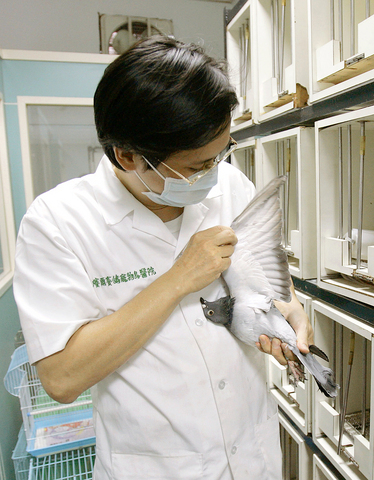Pigeon racing traces its roots to Europe, but Taiwanese have made it their own.
Every year, dozens of racing associations wager tens of millions of NT dollars on birds entered in grueling five-race competitions, while owners of the winners take home huge purses.
It has become such a big business that there are now pigeon hospitals catering to injured competitors with state-of-the-art techniques. And there are birdnappers who ransom the birds.

PHOTO: WALLY SANTANA, AP
Several times a year owners send their birds winging from one end of the island to the other, or flying from platforms at sea to Keelung 300km away.
Competitors are less than a year old and are chosen only after undergoing a rigorous training regime that emphasizes sticking to designated routes and building strength and perseverance.
The stakes are huge. Yeh Cheng-shen, chairman of the Taipei County Pigeon Racing Association and a participant in the sport for 54 of his 68 years, said he won NT$10 million (US$303,000) in a recent five-race meet. He estimated that meet's total pot at more than NT$2 billion.
"There's only one reason why pigeon racing is so popular in Taiwan -- gambling," he says.
Yeh, who estimates the value of his own racing flock in hundreds of thousands of NT dollars, says owners sustain significant losses during the races.
"Three thousand birds started our recent fall meet," he says. "Only 20 or 30 returned at the end of the event."
Yeh says most of the dropouts lose their way along the route, but some are trapped by criminals eager to exact ransoms.
"Gangsters erect these huge nets in valleys and other places the birds have to cross. Then they call the owner and offer to return the bird for what seems like a pretty reasonable price -- about NT$3,000," he says.
With the growth of racing, well-maintained bird hospitals have spread across the country.
The oldest is Taipei's Versele-Laga, established in 1985 by its current director, Li Jaw-yang, a graduate of Taiwan National University.
Li says about half of his clinic's patients are pigeons, nearly all of which are racers.
"Some are suffering from parasites, the kind of malady that any bird is prone to," he says. "But by far the most frequent problem involves injuries they sustain while racing. It's a very difficult sport."

An undersea cable to Penghu County has been severed, the Ministry of Digital Affairs said today, with a Chinese-funded ship suspected of being responsible. It comes just a month after a Chinese ship was suspected of severing an undersea cable north of Keelung Harbor. The National Communications and Cyber Security Center received a report at 3:03am today from Chunghwa Telecom that the No. 3 cable from Taiwan to Penghu was severed 14.7km off the coast of Tainan, the Ministry of Digital Affairs said. The Coast Guard Administration (CGA) upon receiving a report from Chunghwa Telecom began to monitor the Togolese-flagged Hong Tai (宏泰)

A cat named Mikan (蜜柑) has brought in revenue of more than NT$10 million (US$305,390) for the Kaohsiung MRT last year. Mikan, born on April 4, 2020, was a stray cat before being adopted by personnel of Kaohsiung MRT’s Ciaotou Sugar Refinery Station. Mikan was named after a Japanese term for mandarin orange due to his color and because he looks like an orange when curled up. He was named “station master” of Ciaotou Sugar Refinery Station in September 2020, and has since become famous. With Kaohsiung MRT’s branding, along with the release of a set of cultural and creative products, station master Mikan

RISING TOURISM: A survey showed that tourist visits increased by 35 percent last year, while newly created attractions contributed almost half of the growth Changhua County’s Lukang Old Street (鹿港老街) and its surrounding historical area clinched first place among Taiwan’s most successful tourist attractions last year, while no location in eastern Taiwan achieved a spot in the top 20 list, the Tourism Administration said. The listing was created by the Tourism Administration’s Forward-looking Tourism Policy Research office. Last year, the Lukang Old Street and its surrounding area had 17.3 million visitors, more than the 16 million visitors for the Wenhua Road Night Market (文化路夜市) in Chiayi City and 14.5 million visitors at Tainan’s Anping (安平) historical area, it said. The Taipei 101 skyscraper and its environs —

Taiwan on Friday said a New Zealand hamburger restaurant has apologized for a racist remark to a Taiwanese customer after reports that it had first apologized to China sparked outrage in Taiwan. An image posted on Threads by a Taiwanese who ate at Fergburger in Queenstown showed that their receipt dated Sunday last week included the words “Ching Chang,” a racial slur. The Chinese Consulate-General in Christchurch in a statement on Thursday said it had received and accepted an apology from the restaurant over the incident. The comment triggered an online furor among Taiwanese who saw it as an insult to the